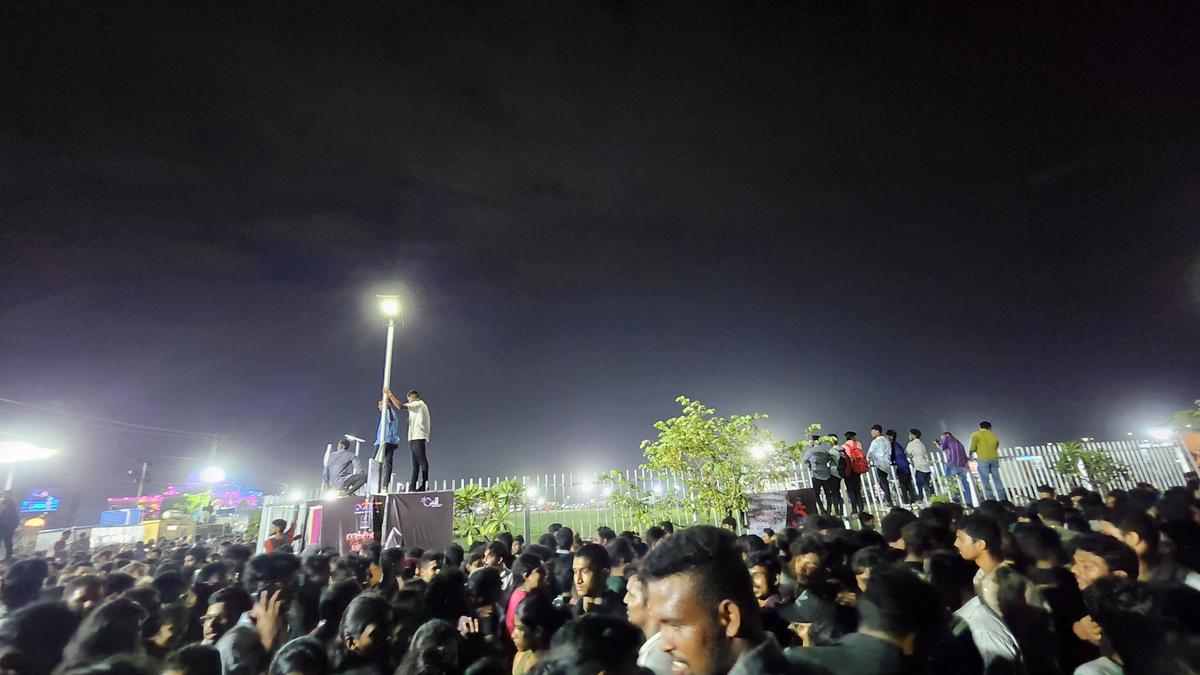
AR Rahman’s Marakkuma Nenjam concert: A fan’s bitter experience
The Hindu
AR Rahman’s Marakkuma Nenjam concert, held on Sunday, saw many distraught fans leave without having watched their musical idol perform live. This included me.
“Stop the show!” chanted a group of middle-aged women snaking through the mammoth crowd at ECR’s Adityaram Palace grounds on Sunday evening as AR Rahman and team’s rendition of ‘Ponni Nadhi’ cut through the air at 7.30pm.
As I scurried past thousands at the gates to the much-anticipated Marakkuma Nenjam concert, armed with ‘Gold’ passes, I often stopped to look up. I needed to draw air.
It all started with a gruelling three-hour ride on a chock-a-block ECR. I reached the venue five minutes into the start of the concert. The venue, the gates to which opened at 3pm, was left with no standing ground for ticket holders even half an hour before the concert began.
Not many attendees, particularly the elderly, anticipated a four-kilometre walk to the venue (of which three kilometres were from the entry point to the stage). This took me another forty minutes, only to be met with a barrage of distressed attendees attempting to scan their online passes: the first point of hold up. The second point of hold up, at the gates to ‘Silver’/ ‘Gold’/ ‘Diamond’ passes, saw crying children and frazzled seniors. Many jumped over barricades, and stood atop emergency fire stations and catering trucks to sneak in a view.
The scene was that of utter chaos as several thousand ticket holders steadily warned others walking in with faint hope.
Many women, including me, were forced to strike a defensive pose to wade through the crowd to avoid uncalled-for shoving. Despite this, there had been reports of groping on social media platforms like X (formerly Twitter). I left the venue feeling unsafe and extremely claustrophobic.
On the walk back, I was met with a swelling group of people who were conveying their grievances to anyone who listened. An unwell woman, who was being escorted back to the entry point on a bike, had completely lost consciousness. The policeman who accompanied her tried desperately for an ambulance. Fifteen minutes later, a car whizzed past with the attendee, as the ambulance was nowhere to be found.

“Writing, in general, is a very solitary process,” says Yauvanika Chopra, Associate Director at The New India Foundation (NIF), which, earlier this year, announced the 12th edition of its NIF Book Fellowships for research and scholarship about Indian history after Independence. While authors, in general, are built for it, it can still get very lonely, says Chopra, pointing out that the fellowship’s community support is as valuable as the monetary benefits it offers. “There is a solid community of NIF fellows, trustees, language experts, jury members, all of whom are incredibly competent,” she says. “They really help make authors feel supported from manuscript to publication, so you never feel like you’re struggling through isolation.”

Several principals of government and private schools in Delhi on Tuesday said the Directorate of Education (DoE) circular from a day earlier, directing schools to conduct classes in ‘hybrid’ mode, had caused confusion regarding day-to-day operations as they did not know how many students would return to school from Wednesday and how would teachers instruct in two modes — online and in person — at once. The DoE circular on Monday had also stated that the option to “exercise online mode of education, wherever available, shall vest with the students and their guardians”. Several schoolteachers also expressed confusion regarding the DoE order. A government schoolteacher said he was unsure of how to cope with the resumption of physical classes, given that the order directing government offices to ensure that 50% of the employees work from home is still in place. On Monday, the Commission for Air Quality Management in the National Capital Region and Adjoining Areas (CAQM) had, on the orders of the Supreme Court, directed schools in Delhi-NCR to shift classes to the hybrid mode, following which the DoE had issued the circular. The court had urged the Centre’s pollution watchdog to consider restarting physical classes due to many students missing out on the mid-day meals and lacking the necessary means to attend classes online. The CAQM had, on November 20, asked schools in Delhi-NCR to shift to the online mode of teaching.









